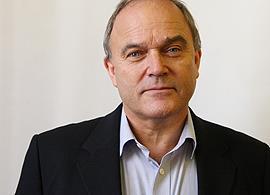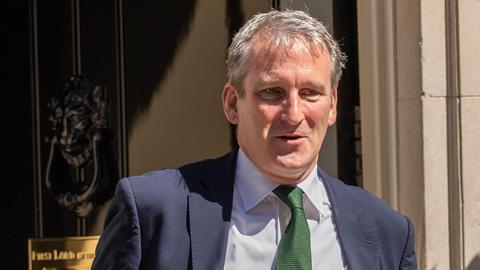Economic crime costs the UK an estimated £37bn a year, according to Damian Hinds MP (pictured right), the government’s minister for security. ‘Serious and organised crime has a hugely corrosive impact on society,’ he continues. ‘Money laundering alone accounts for hundreds of millions of pounds each year, with the profits ploughed back into funding terrorism, drug dealing, people trafficking, prostitution and other serious crimes.’
'Firms are struggling with employee screening because it needs to be done before and after individuals are employed'
Colette Best, Solicitors Regulation Authority
Hinds is giving the opening address at this year’s Law Society anti-money laundering (AML) and financial crime conference (21 September). He tells delegates, almost all of whom are lawyers, that to counter money laundering and financial crime successfully, ‘collaboration is key across all sectors of society, with solicitors having an invaluable role to play. Criminals are relentless in their pursuit of profit and we must be equally relentless in our pursuit of them’.

Criminals often avoid detection thanks to the complicity or mere carelessness of individuals, says Hinds. These individuals should be identified and prosecuted or taught how not, even inadvertently, to assist in the committing of serious crimes.
Reform of the suspicious activities reporting (SARs) regime, says Hinds, will help give the forces of law and order the upper hand. The government has also invested a further £63m into financial crime investigation and strengthened its unexplained wealth scheme. ‘Criminality transcends borders,’ ends Hinds. ‘We need to collaborate internationally through our current presidency of the G7 and other channels.’
And this is when the video recording of Hinds’ presentation ends. The Gazette is not allowed to witness Hinds’ presentation – or that of any other speaker – in real time because, along with all other media, it is not permitted to attend the online conference. No explanation is offered, but the assumption is that the top brass of the various investigatory bodies – such as the National Economic Crime Centre, UK Financial Intelligence Unit and Strategic Centre for Organised Crime – who are talking at the conference prefer not to be seen or quoted by the press. After all, they have dangerous jobs and might be targeted by organised crime. Accordingly, their sessions, including the first plenary – ‘The current and developing economic crime landscape’ – are redacted in their entirety.
This is not the case with the eight concurrent – or breakaway – workshops, or with the session dealing with the Solicitors Regulation Authority’s perspective on AML, recent AML cases that have gone through the courts and the Q&A session that closes the conference. The Gazette is given a recording of these open sessions and copies of the slides used and finds itself spoilt for choice. But here goes.
Plenary: View from the regulator
Colette Best, the SRA’s AML director for the past six years, tells the conference about the latest trends in supervision, investigations, visits to firms and emerging risks.
‘The SRA,’ she says, ‘has so far carried out 200 investigations into a wide range of offences. These range from non-cooperation – not responding to SRA requests for documentation and other information – right up to international fraud and the financing of terrorism.’
Visits to firms have been on hold for 18 months, adds Best, because of Covid. ‘But they have now resumed and we are stepping up the number of visits. After all, we have a constituency of around 6,500 firms to monitor.’ That is not meant to sound like a threat, she assures delegates. Guidance is ‘pretty prolific’ on the SRA website and the SRA is also publishing its annual report, which includes details about firm visits, some time this month.
The most serious problem areas identified by the visits in 2019/20 are employee screening, the independent audit and client due diligence (CDD). ‘Firms are struggling with employee screening because it needs to be done before and after individuals are employed,’ Best says. ‘Conduct and integrity must be regularly scrutinised on an ongoing basis. A risk-based approach is really important here and you should have a policy in place if an employee gets a negative review.
‘The key ingredient of an independent audit is the word independent. Someone outside the firm, or within the firm if they are distanced from what’s being examined, should carry out file reviews, including monitoring and follow-up. You then need to show that you have implemented the auditor’s recommendations. Don’t just put their report in a drawer to gather dust.
‘Finally, CDD. All too often we find that there are good policies in place that are not being followed in practice. This could be because the firm has centralised CDD, but not shared its findings with fee-earners. Again, you need a clearly documented policy, explaining what you have done, what colleagues should do and what you plan to do if a criminal has slipped through the net.’
Best’s attention next turns to the trends that have been identified in the latest round of visits. ‘Most firms were found to be mostly compliant,’ she reports. ‘But some we signed up to a compliance plan that will give them a framework to follow towards full compliance. A handful were referred to investigation and possible sanctions.
‘Some firms were found to have carried out inadequate source-of-funds and wealth checks, others had shortcomings in their client and matter risk assessments and a disappointing 16 firms that we visited were still neglecting their obligation to carry out ongoing monitoring of employees.’
Residential conveyancing firms remain the most investigated, Best tells us. ‘This is largely because of the inadequate supervision or training of fee-earners and the inadequate policies, controls and procedures that the firm has in place. Sadly, there is also the failure of individuals to follow the firms’ policies, controls and procedures.’
Best finishes on a note to ponder. ‘The most troubling emerging risk is the infiltration of law firms by organised crime.’
Breakout workshop: Risk assessments
‘Written risk assessments are not optional,’ states international law firm Latham & Watkins’ compliance and ethics attorney Nicola Kirby. ‘Failure to comply is a criminal offence and the SRA is all over this like a rash.’ The SRA began investigating firms in June 2021 and issuing fines to firms that had taken more than a year to comply with the requirement for a written risk assessment. ‘Why does the SRA take them so seriously? Because risk assessments are the cornerstone of any AML programme. It is no longer a slap on the wrist from the SRA. You can face prosecution.’
'Your risk assessment is a living document. It should be updated from time to time'
Suzie Ogilvie, Freshfields
Kirby and Suzie Ogilvie, Freshfields’ global head of financial crimes and sanctions, are co-presenting the seminar. They give practical tips on preparing an assessment that meets the regulator’s criteria. They also warn of potential pitfalls.
‘Your risk assessment is a living document,’ Ogilvie stresses. ‘It should be updated from time to time. It should focus on clients and transactions and keep a step-by-step record of what you have done to mitigate risk. It is not a generic, tick-box process.’
Risk assessments should be both firm-wide and related to specific matters, continue Kirby and Ogilvie. Everyone should be involved, including fee-earners and anyone else who has access to the files. You should be asking yourself these types of question: Are there factors that make any particular transaction more complex than usual or simply different? Does what the client tells you make sense? What precisely did the client do to earn all this money? The source of funds and wealth causes more angst and queries than any other area of AML.
Kirby ends: ‘The SRA has embarked on a rolling programme of visits – to date, it has asked more than 400 firms for sight of their risk assessments. But help is on hand. You can find lots of guidance and relevant reports on the internet and appropriate websites, including the SRA’s.’
Breakout workshop: Source of wealth and funds
This session is presented by Amy Bell, founder and director of Teal Compliance, which helps firms achieve and maintain compliance with the ever-evolving regulations around money laundering. She begins with the five requirements for effective CDD. The first three involve identification and verification of identity, including identifying and verifying the beneficial owner when the client is not a person, but is a trust or company, for example. There is also the requirement to carry out ongoing monitoring. And finally, there is the requirement to obtain information on the purpose and intended nature of the business relationship.
Bell elaborates on this final requirement with some key questions: ‘What is the purpose of the transaction and is the transaction usual for this type of client? Is it an unusually large or complex transaction? Does it lack economic or legal purpose? If so, then why is the client doing it? And where is the money coming from and how did the client get it? It is crucial to obtain evidence of the source of funds as early as possible.’
A record of employment over at least six months would help answer this last question – except things are rarely straightforward. Bell instances the case of a 31-year-old woman who was planning to buy a property in London. She had regular employment and would pay some £3,000 every month into a savings account. Her transactions through her current account, however, aroused suspicions. Why did she pay no rent, mortgage, council tax or utilities bills? ‘Because,’ says Bell, ‘she was living with her parents. Doubts dispelled.’
Bell continues: ‘We should always establish where the funds are from, where they are going and why. Don’t assume that because they are from a UK bank account, then all is in order. You can’t simply rely upon the bank to do your CDD for you.’
She adds her own unexpected query to the five requirements for effective CDD: ‘Where does the company name come from?’ The company names of most bodies that have been successfully identified as money launderers, she tells us, are ‘two names mashed together’. It is by no means a foolproof way of catching the criminals, but this lack of imagination is something to look out for. Her own company name, by the way, is named for her favourite colour: Teal.
'We should always establish where the funds are from, where they are going and why'
Amy Bell, Teal Compliance
Bell begins to wind down her presentation on a cautionary note: ‘Remember that criminals are baddies and won’t hesitate to take advantage of the elderly, mentally ill, vulnerable – and a person’s trust.’ She gives the example of Stockport solicitor Neil Bolton who, after an unblemished professional career of almost 30 years, was jailed for nine months in 2017 and struck off the roll. Bolton’s offence was failure to identify the source of funds used by drug dealer William ‘Billy’ Black to buy some 28 properties in late 2007 and 2008. Bolton also failed to keep records of his meetings and dealings with Black. The solicitor did not profit from any of these transactions, but was found to have been negligent in fulfilling his AML obligations. ‘He didn’t repeat checks on an ongoing basis,’ says Bell, ‘because he felt he knew Black and trusted him. An AML lesson for us all.’
































2 Readers' comments